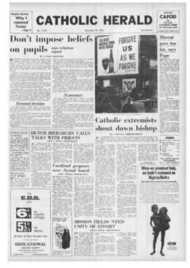Page 1, 19th September 1969
Page 1

Report an error
Noticed an error on this page?If you've noticed an error in this article please click here to report it.
Tags
Share
Related articles
Taking Christ To School
Ofsted Prescribes Moral Lesson
Religious Teaching In State Schools Needs Overhaul'
Melanie Mcd Onagh Crisis Of Faith In The Classroom
Future Of Religious Instruction In Schools
Don't impose beliefs •
on pupils sayepso rt religious
r
BY A STAFF RELIGIOUS teachers should not impose moral concepts upon their ,pupils, but rather help them to recognise the moral, social and religious claims made upon them by society and—if they accept the idea—by God, says a report published this week by the Department of Education and Science.
The report—which does not concern itself with the teaching of religion in denominational schools but rather with the religious situation in county schools—is the result of a weekend Seminar on Religious Education held in March this year. Thirty members of the teaching profession and the Churches attended at the invitation of the Secretary of State.
Although the report does not necessarily state the views of any individual member of the seminar or express the policy of the Department of Education and Science. it does outline "some areas of broad agreement which emerged."
Archbishop Beck of Liverpool was among those who attended. Others included Professor Niblett of the Institute of Education. London University: Rt. Rev. Ian Ramsey, Bishop of Durham. Dr. E. W. H. Briault, Deputy Education Officer of the Inner London Education Authority; Dr. Stopford, Bishop of London: the Rev. Leigh-Woolf. General Secretary of the Christian Education Movement. and Fr. David Konstant, headmaster of St. Michael's College, Stevenage.
Personal decision
The report continues: "Pupils need to form convictions and to adopt principles; religious history and social experience offer relevant evidence. but the decisions arrived at by the pupil must be his own.
"The teacher may himself be convinced of the claims of Christian love and belief. but, if he is to help the pupil critically to discuss and evaluate these demands. he must not represent them as moral absolutes.
"The school must. however. provide opportunities for pupils to discuss and to put into practice moral ideas as part of its education for community, the more so since in the permissive society of today many parents abdicate from this responsibility."
Since the 1944 Education Act, which required that religious education should be given in every county and voluntary school. attitudes have changed, says the report.
Religious education no longer commanded universal support. However, the majority of parents still seemed strongly in favour of the continuance of some form of religious education. even if they held no pronounced religious beliefs themselves.
The report continues: "During the present decade, religious educators have shown themselves alert to the problems and have engaged in an open-minded search for solutions. Our growing knowledge of the process of intellectual development in children has been applied to religious education as to other branches of the curriculum.
"Intellectual maturity is essential to the grasp of some religious ideas. and it is admitted that below the mental age of twelve abstract and conceptual teaching has little value."
According to the report, the aim of religious education is essentially the same as that of education as a whole: to enable the child to recognise and develop his particular gifts and aptitudes. to relate different bodies of knowledge to each other, and to consider some of the deeper aspects of the human situation.
No pressure
The report makes it clear that a teacher in a county school should not press the pupils to accept a faith. "His aim is not to evangelise. but to aid the developments of the pupils' personalities."
On the subject of worship in schools. the report says that this is an experience in which pupils should have the opportunity to share, but warns that the corporate act of worship in secondary schools is often a stumbling block. Formality and dullness are the major causes, rather than the nature of worship itself.
"Change during the last decade has been rapid. farreaching and encouraging." the report concludes, but adds that continuing discussion is necessary before the future standing of religious education in an Education Act is determined. Any statutory clauses ought to permit and not discourage flexibility of approach.
"The wider interpretation of their role by reilgious educators and their desire to make common cause over much of the field with their colleagues in other disciplines augurs well for the future." says the report.
blog comments powered by Disqus









